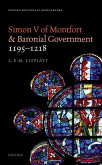Medieval Violence provides a detailed analysis of the practice of medieval brutality, focusing on a thriving region of northern France in the late thirteenth and early fourteenth centuries. It examines how violence was conceptualised in this period, and uses this framework to investigate street violence, tavern brawls, urban rebellions, student misbehaviour, and domestic violence. The interactions between these various forms of violence are examined in order to demonstrate the complex and communicative nature of medieval brutality. What is often dismissed as dysfunctional behaviour is shown to have been highly strategic and socially integral. Violence was a performance, dependent upon the spaces in which it took place. Indeed, brutality was contingent upon social and cultural structures. At the same time, the common stereotype of the thoughtlessly brutal Middle Ages is challenged, as attitudes towards violence are revealed to have been complex, troubled, and ambivalent. Whether violence could function effectively as a form of communication which could order and harmonise society, or whether it inevitably degenerated into chaotic disorder where meaning was multivalent and incomprehensible, remained a matter of ongoing debate in a variety of contexts. Using a variety of source material, including legal records, popular literature, and sermons, Hannah Skoda explores experiences of, and attitudes towards, violence, and highlights profound contemporary ambiguity concerning its nature and legitimacy.
Dieser Download kann aus rechtlichen Gründen nur mit Rechnungsadresse in A, B, BG, CY, CZ, D, DK, EW, E, FIN, F, GR, HR, H, IRL, I, LT, L, LR, M, NL, PL, P, R, S, SLO, SK ausgeliefert werden.









